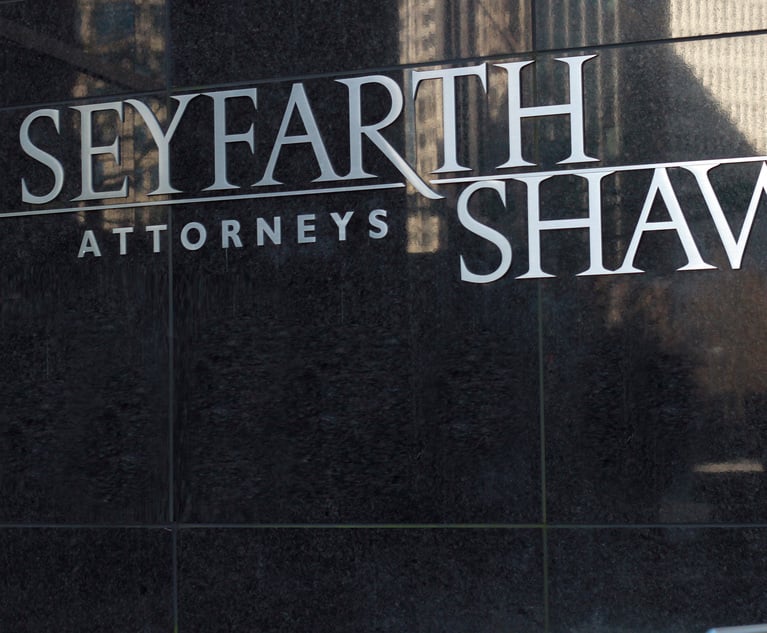 Sharis Pozen, vice president of global competition and antitrust at GE. Jan. 25, 2017.
Sharis Pozen, vice president of global competition and antitrust at GE. Jan. 25, 2017.Photo: Diego M. Radzinschi/ALM.
GE Prepares to Vet Next Slate of Go-To Law Firms
How firms can win work from a general counsel who sets “value as his North Star and diversity as his passion.”
November 09, 2017 at 03:12 PM
4 minute read
As law firms test new ways to woo clients and companies experiment with new ways to assess their outside firms, General Electric is preparing to launch its search to determine who will win coveted four-year spots on its roster of regular outside counsel next year.
“We are going to be designing the next iteration of the program,” said Sharis Pozen, a vice president in GE's law department who oversees the GE Select Program and focuses on antitrust matters for the company.
Overall, the company expects to drive a hard bargain, recognizing that law firms working for GE gain marketplace clout.
“The volume and quality of work that we represent—folks are desirous of our work,” Pozen said.
During the competition, bidding firms should expect GE to focus on their value proposition and the diversity of their ranks, Pozen said. She was echoed by Chris Ende, who joined GE's law department from Goodwin Procter in August 2016 as its head of law firm pricing, solutions and panel management.
Alex Dimitrief, the company's general counsel, sets “value as his North Star and diversity as his passion,” Ende said.
For law firms, rising competition and stagnant demand, particularly for litigators, have upped the significance of so-called beauty contests between firms to represent key corporate clients.
“Litigation is getting to be tougher sledding for many firms, particularly for firms that are not pre-eminent or among the best in any particular subarea of litigation, or geographical area,” said Kent Zimmermann, a legal consultant at the Zeughauser Group.
To stand out for such big-ticket clients as GE, firms must increasingly offer more than just flawless legal pedigrees, 24/7 service and strategic smarts. For GE in particular, that means meeting benchmarks for diversity, but also sometimes providing other services of value for the company—“bells and whistles” as Pozen described them.
The GE Select Program, which the company has offered for decades, allows GE to have fewer but deeper relationships with outside firms, which offer their services at discounted rates and, in exchange, get the company's four-year commitment that their lawyers will be eligible to work for GE.
In addition to straight discounts, firms may offer alternative pricing arrangements such as flat fees, success fees and portfolio pricing. Such alternative fee setups can “make us feel they have skin in the game,” Pozen said.
Among other special services firms now provide, according to Pozen: They are setting up hotlines though which her department may reach a firm lawyer and get free advice about specific targeted matters. And they are more often arranging to have their associates work directly inside GE's legal department through temporary secondments, with the mutual benefits of added in-house muscle and a stronger yoke between client and firm.
“Companies like General Electric have always been savvy purchasers. We are getting more savvy,” Pozen said. Still, she added: “Our goal is never to drive such a hard bargain that we hurt a law firm, their lawyers or their ability to attract talent.”
The company is just beginning the process of designing upcoming competition, since the current GE Select program will expire in 2018. No expectations are yet set at GE for how many firms will compete.
Among the firms that previously made the GE Select list: Weil, Gotshal & Manges; Davis Polk & Wardwell; Morgan, Lewis & Bockius; Jenner & Block; Jones Day; Hogan Lovells; Covington & Burling; Sidley Austin; and Arnold & Porter.
This content has been archived. It is available through our partners, LexisNexis® and Bloomberg Law.
To view this content, please continue to their sites.
Not a Lexis Subscriber?
Subscribe Now
Not a Bloomberg Law Subscriber?
Subscribe Now
NOT FOR REPRINT
© 2025 ALM Global, LLC, All Rights Reserved. Request academic re-use from www.copyright.com. All other uses, submit a request to [email protected]. For more information visit Asset & Logo Licensing.
You Might Like
View All

New Year Brings New Partner Hires for White & Case, Venable, Winston & Strawn
3 minute read
Baker McKenzie, Jones Day, Reed Smith Make 2025 Partner Promotions

Why Hogan Lovells and Perkins Coie Reversed, Will Now Pay Out Special Bonuses to Associates
4 minute readTrending Stories
- 1Chair of Montgomery McCracken Decamps for Morgan Lewis
- 2You Too Can Be a Programmer: Connecting to Legal Platform APIs With Generative AI (Part 2)
- 3Court of Appeals and Appellate Division As Courts of First Instance
- 4Federal Judge Slaps Down the SEC’s Attempt to Regulate Crypto Liquidity Providers
- 5A Client Is Guilty; But Another Man Is Wrongfully Convicted
Who Got The Work
Michael G. Bongiorno, Andrew Scott Dulberg and Elizabeth E. Driscoll from Wilmer Cutler Pickering Hale and Dorr have stepped in to represent Symbotic Inc., an A.I.-enabled technology platform that focuses on increasing supply chain efficiency, and other defendants in a pending shareholder derivative lawsuit. The case, filed Oct. 2 in Massachusetts District Court by the Brown Law Firm on behalf of Stephen Austen, accuses certain officers and directors of misleading investors in regard to Symbotic's potential for margin growth by failing to disclose that the company was not equipped to timely deploy its systems or manage expenses through project delays. The case, assigned to U.S. District Judge Nathaniel M. Gorton, is 1:24-cv-12522, Austen v. Cohen et al.
Who Got The Work
Edmund Polubinski and Marie Killmond of Davis Polk & Wardwell have entered appearances for data platform software development company MongoDB and other defendants in a pending shareholder derivative lawsuit. The action, filed Oct. 7 in New York Southern District Court by the Brown Law Firm, accuses the company's directors and/or officers of falsely expressing confidence in the company’s restructuring of its sales incentive plan and downplaying the severity of decreases in its upfront commitments. The case is 1:24-cv-07594, Roy v. Ittycheria et al.
Who Got The Work
Amy O. Bruchs and Kurt F. Ellison of Michael Best & Friedrich have entered appearances for Epic Systems Corp. in a pending employment discrimination lawsuit. The suit was filed Sept. 7 in Wisconsin Western District Court by Levine Eisberner LLC and Siri & Glimstad on behalf of a project manager who claims that he was wrongfully terminated after applying for a religious exemption to the defendant's COVID-19 vaccine mandate. The case, assigned to U.S. Magistrate Judge Anita Marie Boor, is 3:24-cv-00630, Secker, Nathan v. Epic Systems Corporation.
Who Got The Work
David X. Sullivan, Thomas J. Finn and Gregory A. Hall from McCarter & English have entered appearances for Sunrun Installation Services in a pending civil rights lawsuit. The complaint was filed Sept. 4 in Connecticut District Court by attorney Robert M. Berke on behalf of former employee George Edward Steins, who was arrested and charged with employing an unregistered home improvement salesperson. The complaint alleges that had Sunrun informed the Connecticut Department of Consumer Protection that the plaintiff's employment had ended in 2017 and that he no longer held Sunrun's home improvement contractor license, he would not have been hit with charges, which were dismissed in May 2024. The case, assigned to U.S. District Judge Jeffrey A. Meyer, is 3:24-cv-01423, Steins v. Sunrun, Inc. et al.
Who Got The Work
Greenberg Traurig shareholder Joshua L. Raskin has entered an appearance for boohoo.com UK Ltd. in a pending patent infringement lawsuit. The suit, filed Sept. 3 in Texas Eastern District Court by Rozier Hardt McDonough on behalf of Alto Dynamics, asserts five patents related to an online shopping platform. The case, assigned to U.S. District Judge Rodney Gilstrap, is 2:24-cv-00719, Alto Dynamics, LLC v. boohoo.com UK Limited.
Featured Firms
Law Offices of Gary Martin Hays & Associates, P.C.
(470) 294-1674
Law Offices of Mark E. Salomone
(857) 444-6468
Smith & Hassler
(713) 739-1250








